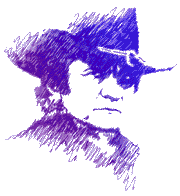

To
millions of fans, Johnny Cash is "the Man in Black," a country music legend
who sings in an
authoritative
baritone about the travails of working men and the downtrodden in this
country. Lesser
known
is the fact that Johnny Cash was present at the birth of rock and roll
by virtue of being one of the
earliest
signees to Sam Phillips' Sun Records back in 1955. Cash was part of an
elite club of rock and
roll
pioneers at Sun that included Elvis Presley,
Carl Perkins and Jerry
Lee Lewis. The four were
collectively
referred to as "the Million Dollar Quartet" after an impromptu gathering
and jam session at
the
Sun recording studio on December 4, 1956. What Cash and his group, the
Tennessee Two, brought
to
the "Sun Sound" was a spartan mix of guitar, standup bass and vocals that
served as an early example
of
rockabilly. Cash recorded a string of rockabilly hits for Sun that included
"Cry, Cry, Cry," "Folsom
Prison
Blues" and "I Walk the Line." The latter was first of more than a dozen
Number One country hits
for
Cash and also marked his first appearance on the national pop singles charts.
Straddling
the country, folk and rockabilly idioms, Johnny Cash has crafted more than
400 plainspoken
story-songs
that describe and address the lives of coal miners, sharecroppers, Native
Americans,
prisoners,
cowboys, renegades and family men. Cash came by his common touch honestly,
having been
born
in Kingsland, Arkansas, during the Great Depression on February 26, 1932.
At age three, he
moved
with his family to Dyess, Arkansas, where he worked the cotton fields.
Cash's roaming days
included
laboring at an auto plant in Michigan, serving in the Air Force in Germany,
and working as an
appliance
salesman in Memphis. Cash became a full-time musician after his two-sided
hit -- "So
Doggone
Lonesome"/"Folsom Prison Blues" -- shot to Number Four on the Billboard
country chart in
1956.
From Sun, he jumped to Columbia Records in 1958, where he recorded such
favorites as "Ring
of
Fire," "Understand Your Man," "Don't Take Your Guns to Town" and "Tennessee
Flat-Top Box."
But
Cash never forgot his roots, nor did he leave hard times behind. A prototype
for the black-clad
rebel
rocker, Cash cultivated a serious drug problem in the Sixties, which ended
when he met his second
wife,
June Carter, whom he married in 1968.
Some
of Cash's best work includes live albums recorded, quite literally, for
captive audiences at Folsom
and
San Quentin prisons. Johnny Cash at San Quentin included the 1969 hit "A
Boy Named Sue,"
which
went to Number Two. In 1969, Cash cut a duet with Bob Dylan for the latter's
Nashville
Skyline,
and Dylan returned the favor by appearing on The Johnny Cash Show, a successful
TV variety
hour
that premiered in 1969. All the while, the rugged simplicity and uncut
honesty of Cash's approach
was
steadily seeping into rock and roll by way of the burgeoning country-rock
scene. Cash has remained
a
stalwart figure and working musician to the present day. His career received
a shot in the arm in the
mid-Nineties
when he released what many consider to be his finest album to date, a stark
study for guitar
and
voice entitled American Recordings.